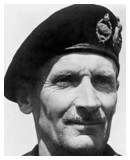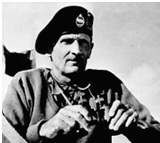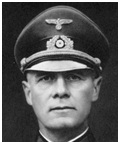|
 |
|
 |
Bernard Montgomery Leadership
Bernard Montgomery (1887-1976)
Monty (which most people called him) was the most famous British general of World War Two. He led the British army to victory:
For more detail see... D-Day in the History Highlights section.
Why was he a great leader?
1. Inspiration and self-discipline He believed that a leader must have the power (“spiritual quality”) to inspire others. He did this by instilling into his troops his own:
Just before the Battle of El Alamein, Montgomery (pictured right at the battle in his inspirational black beret) told them in a personal message that they would win, and he believed that a leader’s most vital characteristics were to:
To help achieve this self-discipline, he kept a strict, regular regime of:
2. Clear objectives He defined his aims clearly and then achieved them by:
3. Communication and encouragement When he took over the leadership of the 8th Army, it was demoralized after a series of defeats. So he:
He looked straight at the officers without any notes and told them about his plan to destroy the Germans and Italians in North Africa. “It can be done and it will be done”, he told them, and added that every soldier must know what
to do and how to do it. So everyone was told his plan at El Alamein before the battle (pictured right). He also effectively communicated with the air force because of the vital importance of a co-ordinated air and land attack. 4. Support from his troops He would have achieved nothing without the ability and commitment of his men, particularly Francis (known as Freddie) de Guingand (pictured right), his brilliant chief-of-staff, responsible for implementing Monty’s orders and so allowing him to focus on the big issues. Freddie’s humour and sensitivity perfectly complemented Monty’s brusque, sometimes brutal,
behaviour. Another key officer was Bill Williams (pictured right), who provided vital information from decoded German messages. But Monty believed that the most important part of his army was the ordinary soldiers and their immediate commanders. He believed that his men's morale was more important than anything else, and success in battle was the best way to achieve it. “Nothing is ever hopeless, so long as troops have stout hearts and have weapons and ammunition”, he said.
5. Learning and training Monty thought that knowledge was much more important than personality, So he constantly learned from:
Monty encouraged everyone to learn from mistakes and made sure they were adequately trained to improve the three things he believed won battles:
6. Successful decision making “Decisions and plans must be adaptable to changing situations”, Montgomery said. For example, at El Alamein one of his generals persuaded him to change his original plan and give more infantry support to the artillery. But Montgomery refused to change, if he thought he was right. For example he resisted pressure from the British prime minister, Winston Churchill (pictured right together in 1945) to fight El Alamein a month earlier in September, because his troops needed more training. He made time for quiet thought in the early morning and evening to consider all aspects of a problem before making a decision. But he never worried afterwards and was always calm in a crisis. He never immersed himself in operational detail, so he could concentrate on battle strategy. 7. Ruthless integrity He was ruthless with:
People will accept this, he said, if “the leader is ruthless with himself”. Montgomery (pictured right above as a young officer) won people's respect through:
8. Determination and focus He never gave in to life's problems, particularly:
But his egotistic focus sometimes blinded him to the truth. For example, during the invasion of Europe in 1944-5 after D-Day, he never fully accepted:
So his American military boss, Dwight D. Eisenhower (pictured together right planning D-Day), was often infuriated by him
9. Religious faith He inherited the faith of his beloved father, Henry, a Church of England priest, which helped him through his personal and professional problems. 10. Luck In World War One (pictured right) he was saved from certain death by a soldier who shielded him from enemy fire after being killed dressing Monty’s wound. At El Alamein the number and firepower of his army was far greater than the enemy’s. He had twice as many tanks and 90,000 more men.
Key quotes on leadership and management Leadership is the capacity and will to rally men and women to a common purpose and the character which inspires confidence. The beginning of leadership is a battle for hearts and minds of men. The leader must have infectious enthusiasm. Officers are trained to lead soldiers in battle, but unless they fully understand all their problems and gain their confidence, the battle will be lost.
Key quote on motivation Battles are won in the hearts of men.
Key quotes on war The morale of the soldier is the greatest single factor in war. The greatest single factor in winning a war is the understanding of man management.
Key quote on human resource management Every soldier must know, before he goes into battle, how the little battle he is to fight fits into the larger picture, and how the success of his fighting will influence the battle as a whole.
Key quote on fear and pain Discipline strengthens the mind so that it becomes impervious to the corroding influence of fear.
|
|
|
||
|
|
|
||
|
||
| Copyright © wisdomtowin.com All Rights Reserved | ||
|











